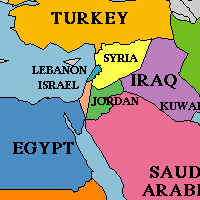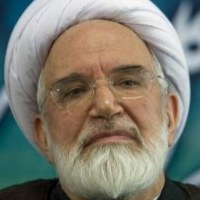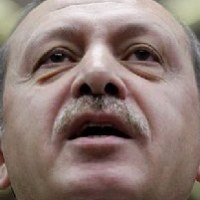Published: March 21, 2010; Other than apartments in Jerusalem, what else is going on in the Middle East?
by Barry Rubin,
While the Obama Administration is fiddling over the construction of apartments in Jerusalem, the Middle East is burning. Yet these other issues don’t attract the attention—and certainly not the action—required.
1. Iran is now allied with al-Qaida: General David Petraeus, head of the U.S. Central Command, revealed a bombshell story that has been ignored: Iran is helping al-Qaida attack Americans.
Iran, he said in military-speak, provides “a key facilitation hub, where facilitators connect al Qaida’s senior leadership to regional affiliates.” Translation: Tehran is letting al-Qaida leaders travel freely back and forth to Pakistan and Afghanistan, using its territory as a safe haven, while permitting them to hold meetings to plan terrorist attacks for attacking U.S. targets and killing Americans. While nominally Iran sometimes takes these people into custody, that seems, Petraeus says, a fiction to fool foreigners.
Oh, and Petraeus added that Iran also helps the Taliban fight America in Afghanistan. Regarding Iraq, the general explains, “The Qods Force [an elite Iranian military group within the Islamic Revolutionary Guard Corps] also maintains its lethal support to Shia Iraqi militia groups, providing them with weapons, funding and training,”
So, Petraeus pointed out that Iran is helping al-Qaida against the United States and also, at times, Shia groups intended to be Iran’s proxies for spreading its influence in Iraq. In effect, the Tehran regime is at war with the United States. Yet this point is not being highlighted, nor does it stir rage in the hearts of White House officials or strenuous attempts to counter this threat.
Meanwhile, Iran isn’t just building apartments but nuclear weapons’ facilities.
2. Lebanon being further integrated into Iran-Syria alliance
In an interview with al-Jazira television, Walid Jumblatt, formerly the roaring lion of the opposition, turns into a mouse and apologizes to Syrian dictator Bashar al-Asad:
“I said, at a moment of anger, what is improper and illogical against President Bashar Assad.” And now he is begging for an invitation to Damascus where he can kiss the ring of the man whose father (Hafiz al-Asad) murdered his father (Kemal Jumblatt).
One cannot blame Walid Jumblatt nor Sa’d al-Hariri, leader of the March 14 coalition, whose father was murdered by Bashar himself and has already gone to Damascus to beg forgiveness.
But Jumblatt, leader of the main Druze community in Lebanon, was a man who not long ago denied comparing Bashar al-Asad to a dog by saying that to do so would be an insult to canines. Jumblatt was also the man who bragged about being a friend of the United States during his rebellious phase. No more.
Meanwhile, Hizballah, which enjoys veto power in Lebanon’s government, isn’t just building apartments, its building fortifications and importing record amounts of weapons.
3. It is now clear that Russia and China won’t support sanctions on Iran. The administration’s plan is in major trouble and there’s no way out, except to do the most minimal possible sanctions and claim victory.
Russia openly defies the Obama Administration by insisting it will finish a nuclear plant for Iran, just when Secretary of State Hilary Clinton is visiting! This was a real slap in the face, much bigger strategically than the apartments’ issue. But there will be no strong reaction from Washington.
According to Russian President Dmitry Medvedev:
“We believe that [engagement with Iran is] not over yet, that we can still reach an agreement.”
So Russia still isn’t ready to support sanctions and isn’t building apartments in Iran but rather a nuclear reactor.
Same thing with China, whose Foreign Ministry spokesman Qin Gang put it this way:
“We believe there is still room for diplomatic efforts and the parties concerned should intensify those efforts.”
China isn’t building apartments in Iran but developing oilfields and building a huge oil refinery, plus reportedly supplying weapons.
4. Despite U.S. concessions aimed to reduce Syria’s alliance with Iran, their bond is getting stronger, as witnessed by Asad’s invitation to Iranian President Mahmoud Ahmadinejad to Damascus and their signing of new cooperation agreements. During the press conference, Asad literally laughed at U.S. policy.
5. Increasing signs of Turkey’s close cooperation with the Iran-Syria axis. Both Ahmadinejad and the official Syrian government newspaper now call Turkey an ally of Syria and Iran.
Turkish Prime Minister Recep Tayyip Erdogan sounds the same way, insisting that Iran has no intention of developing nuclear weapons, that Ahmadinejad is a “friend,” and that the United States has no right to try to stop Iran from getting such weapons any way.
The Turkish government isn’t building just apartments but an alliance with Tehran and an increasingly Islamist regime at home.
So let’s leave it to Ahmadinejad to summarize how things seem to Iran, Syria, Hamas, Hizballah, and lots of Arabs both pro- and anti-American:
The Americans, Ahmadinejad said, “not only have failed to gain any power, but also are forced to leave the region. They are leaving their reputation, image, and power behind in order to escape… The [American] government has no influence [to stop]… the expansion of Iran-Syria ties, Syria-Turkey ties, and Iran-Turkey ties–God willing, Iraq too will join the circle….”
Iran is also building not just apartments and not even just nuclear facilities and not even just revolutions abrod. It’s also building an empire or, to put things more modestly, a very large sphere of influence.
In short, the regional situation is terrible. None of this really has much to do with Arab-Israeli or Israeli-Palestinian issues; none of this is going to change because U.S. policy is seen as being tough on Israel. What the Arabs want to see is whether U.S. policy is going to be tough on Iran and its allies.
The Obama Administration policy isn’t making the radicals more moderate but rather–by feeding their arrogance and belief in American weakness–making them more aggressive. Every day the regional situation is becoming more dangerous, but the highest-level and highest-priority U.S. efforts seem to be largely over getting indirect Israel-Palestinian talks which everyone involved knows will produce nothing.
Something is seriously wrong here. Of course this isn’t the first time such things have happened in battling aggressive dictatorships, both in the case of Germany and of the USSR. Still, one can only echo the words of George Orwell, written in his diary in early 1941:
“The most depressing thing in this war is not the disasters we are bound to suffer at this stage, but the knowledge that we are being led by weaklings… It is as though your life depended on a game of chess, and you had to sit watching it, seeing the most idiotic moves being made and being powerless to prevent them.”
About the Author:
Barry Rubin is director of the Global Research in International Affairs (GLORIA) Center and editor of the Middle East Review of International Affairs (MERIA) Journal. His latest books are The Israel-Arab Reader (seventh edition), The Long War for Freedom: The Arab Struggle for Democracy in the Middle East (Wiley), and The Truth About Syria (Palgrave-Macmillan). His new edited books include Lebanon: Liberation, Conflict and Crisis; Guide to Islamist Movements; Conflict and Insurgency in the Middle East; and The Muslim Brotherhood.



 RSS
RSS












RT @CrethiPlethi: the Obama Administration's double standards on the Middle East #israel #us #obama #tcot #jcot http://j.mp/d5iIGF
RT @coppernickel119: RT @CrethiPlethi: the Obama Administration's double standards on the Middle East #israel #us #obama #tcot #jcot http://j.mp/d5iIGF
RT @CrethiPlethi: the Obama Administration's double standards on the Middle East #israel #us #obama #tcot http://j.mp/d5iIGF http://ff.im/hVmuQ